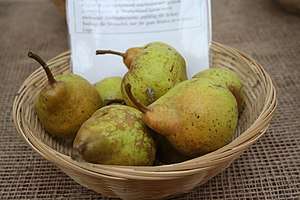pere
Afrikaans
Dutch
Esperanto
Pronunciation
Audio (file)
Estonian
Etymology
From Proto-Finnic *pereh.
Declension
Inflection of pere (ÕS type 16/pere, no gradation)
| singular | plural | |
|---|---|---|
| nominative | pere | pered |
| accusative | pere | pered |
| genitive | pere | perede |
| partitive | peret | peresid |
| illative | perre peresse |
peredesse |
| inessive | peres | peredes |
| elative | perest | peredest |
| allative | perele | peredele |
| adessive | perel | peredel |
| ablative | perelt | peredelt |
| translative | pereks | peredeks |
| terminative | pereni | peredeni |
| essive | perena | peredena |
| abessive | pereta | peredeta |
| comitative | perega | peredega |
Hungarian
Pronunciation
- IPA(key): [ˈpɛrɛ]
- Hyphenation: pe‧re
Declension
| Inflection (stem in long/high vowel, front unrounded harmony) | ||
|---|---|---|
| singular | plural | |
| nominative | pere | — |
| accusative | perét | — |
| dative | perének | — |
| instrumental | perével | — |
| causal-final | peréért | — |
| translative | perévé | — |
| terminative | peréig | — |
| essive-formal | pereként | — |
| essive-modal | peréül | — |
| inessive | perében | — |
| superessive | perén | — |
| adessive | perénél | — |
| illative | perébe | — |
| sublative | perére | — |
| allative | peréhez | — |
| elative | peréből | — |
| delative | peréről | — |
| ablative | perétől | — |
Ingrian
Italian
Middle Dutch
Inflection
This noun needs an inflection-table template.
Middle English

peres
Etymology 1
From Old English pere, peru, from Vulgar Latin *pira, from Latin pirum.
Noun
- A pear (fruit of Pyrus communis)
- A thing of little import or worth.
References
- “pē̆re, n.(1).” in MED Online, Ann Arbor, Mich.: University of Michigan, 2007, retrieved 2019-04-20.
Etymology 2
From Medieval Latin pera, from Old Northern French pira, from Vulgar Latin *petricus.
Pronunciation
- IPA(key): /ˈpɛːr(ə)/
Descendants
- English: pier
References
- “pēr(e, n.(2).” in MED Online, Ann Arbor, Mich.: University of Michigan, 2007, retrieved 2019-04-20.
Etymology 3
From Old French per and Anglo-Norman peir, from Latin pār.
Pronunciation
- IPA(key): /peːr/
Noun
pere (plural peres)
- A peer; one who is equal to or like another.
- A rival, enemy, or competitor; one who is in opposition.
- An individual who is of the same social class or standing as another.
- An associate or collaborator; one who works or associates with another.
- A member of the nobility or ruling class of a country or settlement.
- (anatomy, rare) A body part connected or concomitant with another.
References
- “pẹ̄r, n.” in MED Online, Ann Arbor, Mich.: University of Michigan, 2007, retrieved 2019-04-21.
References
- “pẹ̄r, adj.” in MED Online, Ann Arbor, Mich.: University of Michigan, 2007, retrieved 2019-04-21.
Middle French
Etymology
From Old French pere, from Latin pater, patrem.
Old French
Alternative forms
Etymology
From earlier pedre, from Latin pater, patrem.
Noun
pere m (oblique plural peres, nominative singular pere, nominative plural pere)
- father (male family member)
Alternative forms
Tocharian B
Etymology
From Proto-Indo-European *per-. Compare Sanskrit पर्वन् (parvan).
Further reading
- Adams, Douglas Q. (2013) A Dictionary of Tocharian B: Revised and Greatly Enlarged (Leiden Studies in Indo-European; 10), Amsterdam, New York: Rodopi, →ISBN
Walloon
Etymology
From Old French pere, pedre, from Latin pater, patrem.
This article is issued from
Wiktionary.
The text is licensed under Creative
Commons - Attribution - Sharealike.
Additional terms may apply for the media files.